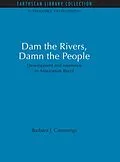The Brazilian Amazon is the largest area of tropical rainforest in Latin America. Brazil is that continent's most rapidly developing country. The Amazon is at the heart of the conflict between conservation and development, between people and power, and between heritage and modernisation.
In the name of development, the powerful are colonizing the forest. The greatest new threat comes from the massive hydro-electric schemes which are being pushed ahead with little regard to efficacy, the rights of the people, or the survival of the forest. Dam the Rivers, Damn the People is about two of the most affected areas, Balbina in Amazonas and the Xingu River in Para. Barbara Cummings describes the plans which the state attempted to keep secret, the extent to which these projects will destroy the forest, the consequent dispossession of the people of the forest and, above all, their growing resistance. She shows how the outcome of their fight affects us all.
Originally published in 1990
Autorentext
Authored by Cummings, Barbara J.
Zusammenfassung
The Rights and Wrongs of Land Restitution: 'Restoring What Was Ours' offers a critical, comparative ethnographic, examination of land restitution programs. Drawing on memories and histories of past dispossession, governments, NGOs, informal movements and individual claimants worldwide have attempted to restore and reclaim rights in land. Land restitution programs link the past and the present, and may allow former landholders to reclaim lands which provided the basis of earlier identities and livelihoods. Restitution also has a moral weight that holds broad appeal; it is represented as righting injustice and healing the injuries of colonialism. Restitution may have unofficial purposes, like establishing the legitimacy of a new regime, quelling popular discontent, or attracting donor funds. It may produce unintended consequences, transforming notions of property and ownership, entrenching local bureaucracies, or replicating segregated patterns of land use. It may also constitute new relations between states and their subjects. Land-claiming communities may make new claims on the state, but they may also find the state making unexpected claims on their land and livelihoods. Restitution may be a route to citizenship, but it may engender new or neo-traditional forms of subjection. This volume explores these possibilities and pitfalls by examining cases from the Americas, Eastern Europe, Australia and South Africa. Addressing the practical and theoretical questions that arise, The Rights and Wrongs of Land Restitution thereby offers a critical rethinking of the links between land restitution and property, social transition, injustice, citizenship, the state and the market.
Inhalt
Preface
Acronyms and Abbreviations
Introduction
1. Amazonian Development: An Overview
Boom-Bust Cycles of Amazonia
Government Control and 'Mega-Projects'
2. Dams in the Rainforest: What Do We Know?
Definition of Tropical Rainforests
Tropical Soils and Dams
Forest Flooding and Water Cycles
Species Losses to Reservoirs
Dams and Disease Proliferation
Hydro-Development and Indigenous Peoples
3. The 2010 Plan
4. Balbina: A Case Study
History
Resistance
5. Altamira-Xingu: Birth of the Resistance
The Kararao Hydroelectric Project
Resistance
Environmentalists/Ecologists
Social Justice/Minority Political Parties
Native Peoples/Human Rights Activists
6. Under the Politics of Development
7. Prospects for the Future
Alternatives
Strengthening the Resistance
Epilogue
Appendix
References
Index
